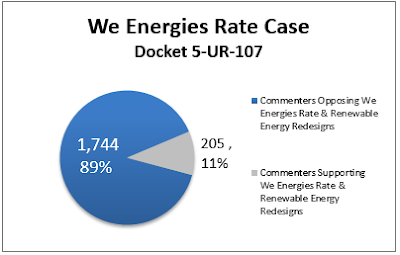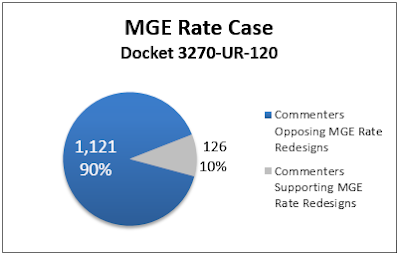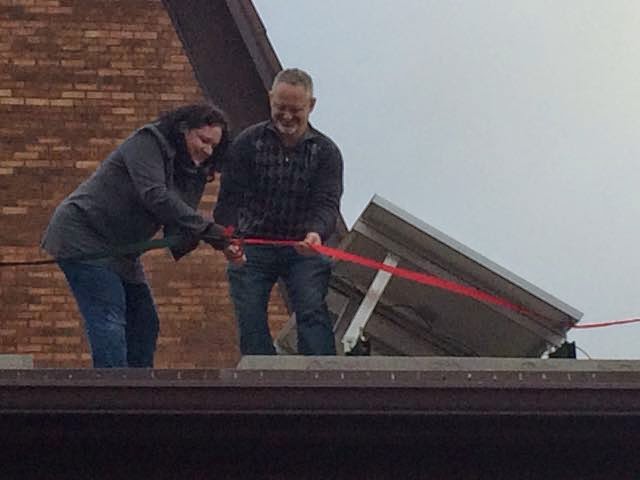
by jboullion | Dec 19, 2014 | Uncategorized
Two Madison Churches Tap into a Higher, Cleaner Power
by Michael Vickerman
December 18, 2014
The sun is shining a little brighter this December on two church congregations in the Schenk-Atwood neighborhood. Zion Lutheran and Trinity Lutheran churches are commissioning rooftop solar photovoltaic arrays that, once energized, will help power good works in and around Madison’s East Side.
Trinity Lutheran Church, 1904 Winnebago Street, will host a post-Sunday service ceremony on the winter solstice, December 21st, starting at approximately 10:30am. Pastor Susan Schneider will deliver a blessing upon the 19.9 kW solar project, followed by a ribbon-cutting ceremony featuring local solar developer Kurt Reinhold and RENEW Wisconsin’s Michael Vickerman. For more information, contact Michael at mvickerman@renewwisconsin.org or call (608) 255.4044×2.
 |
| Photo Cred: Sustainable Atwood |
Zion Lutheran Church, 2165 Linden Avenue, near Atwood Avenue, held its ribbon-cutting ceremony on December 17th. Intern pastor Stacy Gahlman-Schroeder led the dedication ceremony, followed by Pastor Jeff Wild from Advent Lutheran, which donated the panels to Zion.
Both Zion and Trinity’s installations should be fully energized before the weekend. Both churches are combining solar with efficiency improvements to maximize the value of the energy they use while at the same time improving public health, reducing environmental pollution, and cutting operational costs.
Background. Sustainable Atwood’s Solar Program helped bring the parties together for each of these two churches as part of its mission to move the neighborhood in the direction of a cleaner and more sustainable energy future. Zion Lutheran now hosts the offices of Sustainable Atwood’s community operations, and became the spark for this joint venture. Until recently, the solar panels now on Zion’s parish roof graced a Madison west side church—Advent Lutheran, off Old Sauk Road. When it commissioned its 2.8 kW PV system in late 2002, Advent Lutheran became the first solar-powered church in Wisconsin. These panels were taken down in 2013 when Advent’s roof was replaced. Instead of putting its 12-year-old photovoltaic system back on its roof, Advent’s congregation decided to acquire a much larger array, which was installed and commissioned in July 2014. Instead of selling their 18 panels, which even after 12 years will operate at 94% of their original productivity, Advent donated them to Sustainable Atwood.
Burke and Mark O’Neal, the brothers who own the solar contracting company Full Spectrum Solar on East Washington Avenue, are sponsors of Trinity Lutheran Church’s solar project, which consists of 78 panels atop the south-facing roof along First Street. Members of the congregation and community residents can support this project through Sustainable Atwood’s Switch-to-Solar program. For more information on this and other community solar projects, please contact Solarconnections@gmail.com.
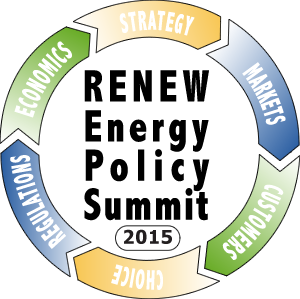
by jboullion | Dec 16, 2014 | Uncategorized
Immediate release
December 17, 2014
More information
Tyler
Huebner, Executive Director
608.255.4044
x 1
Keynotes and Agenda Set for January Renewable Energy Policy Summit
Event Aims to Unlock the
Clean Energy Transition
 RENEW Wisconsin will host
RENEW Wisconsin will host
its fourth annual Renewable Energy Policy Summit on Friday, January 9th, 2015
at UW-Madison’s Union South. The theme of the event, “Unlocking the Clean
Energy Transition,” will highlight the importance of renewable energy to
Wisconsin’s economy. The early-bird registration deadline is Saturday, December
20th.
The event will feature two
keynote speakers. They are:
- Brad Klein, Senior Attorney at the Environmental Law &
Policy Center, will kick off this year’s program. Brad will cover the recently
concluded utility rate cases, and the Iowa Supreme Court ruling in 2014 which
allowed third-party financing of solar.
- Jigar Shah, President of Generate Capital and founder of
SunEdison, will deliver the afternoon address. Widely known as a clean energy visionary, Jigar
will offer his perspective on the emerging opportunities for powering the
economy of the future with clean energy’s impact on the economy.
Between the opening and
closing keynotes, panelists and presenters will emphasize the economic and
business opportunities for renewable energy, highlighting new planning initiatives,
projects and anticipated regulatory changes. These include:
-
A morning panel of state and local policymakers will discuss
targeted efforts to advance renewable energy options as state energy policy
evolves. The panel will feature Representative Chris Taylor (D-78 Madison) and Matt
Howard, Sustainability Director for the City of Milwaukee. Additional legislators and local officials
have been invited.
- A lunchtime presentation on Vernon Electric
Cooperative’s trail-blazing community solar installation, located alongside its
headquarters in Westby.
- Four afternoon presentations examining scenarios for
expanding renewable energy market share:
—What’s Next for Solar (Matt Neumann, owner, Pewaukee-based
SunVest Solar)
— Bioenergy and Energy Independence (Jeff Rich, director
of the Envision energy initiative for La Crosse-based Gundersen Health System)
— Big Vision for Wisconsin’s Renewable Energy (Jane
Elder, executive director of Wisconsin Academy of Science, Arts, and Letters)
–Renewable Energy for the Clean Power Plan (Gary
Radloff, Director, Midwest Energy Power Analysis, UW Energy Institute)
Following the afternoon
keynote, an awards ceremony will recognize the most noteworthy installations
energized in 2014 and honor Wisconsin leaders in renewable energy.
RENEW Wisconsin’s
Executive Director Tyler Huebner says, “We chose this year’s theme to highlight
the tremendous economic development potential for Wisconsin from harvesting
more of its own home-grown energy sources, and contrast it to the current
uphill battle many renewable energy businesses currently face in this
state.”
The early-bird deadline
for registration is Saturday, December 20th. Early-bird rates are $85 for
Members of RENEW Wisconsin and $110 for non-members, and rates will go to $95
and $125 respectively after the deadline. The rate for government employees is
$85 and for students is $35; these two rates won’t change with the deadline.
Membership with RENEW starts at $35 for individuals and $200 for businesses and
organizations.
-END-
RENEW
Wisconsin leads and accelerates the transformation to Wisconsin’s renewable
energy future through advocacy, education, and collaboration. More information on RENEW’s Web site
at www.renewwisconsin.org.
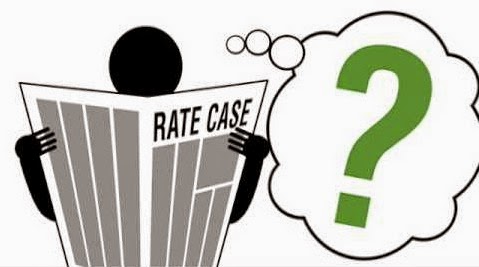
by jboullion | Dec 1, 2014 | Uncategorized
In a 2-1 decision on Wednesday, November 26,
2014, the Public Service Commission approved Madison Gas & Electric’s
request to increase monthly fees for all customers starting in 2015.
For residential customers, electricity service
will cost $19 each month before using any energy, and natural gas service will
cost $21.87 each month before using any gas.
For a residential customer with both electricity and gas, monthly fees
will go from $22.61 up to over $40.
Commissioners Phil Montgomery and Ellen Nowak,
as they have for Wisconsin Public Service and We Energies in recent cases, supported these
changes, while Commissioner Eric Callisto disagreed and would have limited
these increases while opening a broader discussion on the topics.
A number of decisions were reached on these
issues, which are outlined below:
· Overall residential customers for electricity will see on average an increase of about
3.5%. Small commercial customers will have an increase of about 1%, while
larger business and industry customers will see a higher increase of around 4%.
· Fixed monthly charges for residential electricity service will be $19
· Fixed monthly charges for residential natural gas service will be $21.87
· Customers with existing solar and small wind systems will be
“grandfathered” under the current rates for 12 years
· Customers who subscribe to “Green Power Tomorrow,” the voluntary
program where customers pay extra to participate in renewable energy projects,
will pay less for that service. The
premium price will be reduced from 4 cents per kilowatt-hour down to 2.44 cents
per kilowatt-hour.
· Chairperson Montgomery offered some advice to MG&E on the
collaborative process they intend to have with customers and communities they
serve.
o MG&E should look at instituting extra fees on customers with solar
and other forms of “distributed generation” and reducing the payback, as We
Energies proposed (and was approved)
o MG&E should institute monthly “netting” of distributed generation
o Approaches such as the “value of solar” are not needed because the
current wholesale market sets the price.
o Any extra electricity created, but not used, by those distributed
generation systems should be paid at the wholesale market price, which is in
the range of four cents per kilowatt-hour, instead of being credited at retail
rates which are closer to 13-14 cents.
The Commission voted not to approve a separate
arrangement that would shield low-income customers from these fixed rate hikes. Therefore, all customers will be exposed to
the fixed rate increases in 2015.
by jboullion | Nov 14, 2014 | Uncategorized
RELEASED FRIDAY, NOVEMBER 14, 2014
MADISON, WI – With a 2-1 vote voiced at an open meeting Friday afternoon, the Wisconsin Public Service Commission approved a 75% increase in monthly fixed charges and sweeping changes that will pile additional charges on customers who choose to install solar energy panels starting in 2015. The vote was split down partisan lines with Gov. Scott Walker appointees Chairperson Phil Montgomery and Commissioner Ellen Nowak supporting the changes; and Commissioner Eric Callisto, an appointee of Gov. Jim Doyle, opposed.
“Under this decision, customers who use more will see lower bills and customers who use less will see higher bills. It sends the wrong price signals on energy efficiency because it makes it harder for customers to control their monthly bills,” said Robert Kelter, senior attorney with the Environmental Law & Policy Center.
“The Public Service Commission has effectively approved a new tax to be collected from residential and small business customers that would like to create some of their own energy, such as with solar panels,” said Tyler Huebner, executive director of RENEW Wisconsin. “This decision is bad for job creation, bad for energy independence, bad for the environment, and bad for customers. Today our Republican-appointed Commissioners approved a new tax, killed jobs, and restricted energy choice in Wisconsin.”
“The commission has ignored the facts in this case and decided whether you embrace energy efficiency, or want to generate some of your own electricity with solar panels, you should pay more,” Kelter said.
“It also ignored a record level of over 1,900 public comments, 89% of which were opposed to these changes,” Huebner added.
The Public Service Commission decision will:
- Increase monthly fixed fees from $9.13 to $16.00
- Impose a $3.79 monthly tax on every kilowatt of a solar installation (a 4 kilowatt system would pay $181.97 a year)
- Transfer about 40% of the value of solar installation from the homeowner to We Energies through changes in payments and charge
- Pay just 4.2 cents for every kilowatt-hour of energy generated by customer renewable energy systems
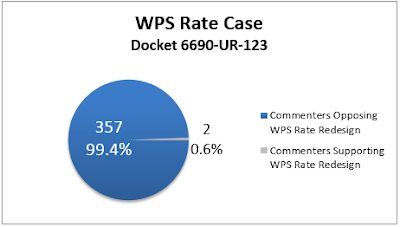
by jboullion | Nov 12, 2014 | Uncategorized
A new analysis conducted by RENEW Wisconsin of the public comments filed in three controversial utility rate cases shows that over 90% of the more than 3,500 public comments offered are opposed to the rate hikes and changes to how customers with renewable energy systems will be treated. Read the full report, “Wisconsin Utility Rate Redesigns Overwhelmingly Unpopular“.
In addition to the analysis, the report includes several quotes from the large variety of stakeholders who made their voices heard in this public process, and a listing of businesses and organizations that made time to participate. From seniors to social workers, businesses to students, shareholders to household Wisconsin brands like Organic Valley, people and organizations made public comments in record numbers.
The three utilities that have proposed these changes include Wisconsin Public Service (WPS) out of Green Bay, We Energies based in Milwaukee, and Madison Gas & Electric (MGE). A typical rate case receives comments numbered in the dozens at most. WPS’ case received nearly 360 comments, with only 2 individuals supportive of the change. That means over 99% of commenters in the WPS case were in opposition to the fixed rate hike.
In addition to those comments, over 7,500 individuals signed onto petitions opposing the rate change for WPS, and those petitions were also entered into the record.
Comments for We Energies and MGE were due a month later, in early October, and the volume of comments hit an even higher order of magnitude. Approximately 1,950 comments were offered in the We Energies case and 1,250 in MGE’s, with 89% and 90% opposed in those respective proceedings.
“The public showed tremendous concern for the bill increases, reduced incentive to conserve energy, and reduced customer control over their energy bill that these proposals will bring about. With so many comments filed, we wanted to make sure that the volume and tremendous content from the public was summarized and presented for the world to see,” said RENEW Wisconsin’s Executive Director, Tyler Huebner.

by jboullion | Nov 10, 2014 | Uncategorized
 |
| Photo of Forward Wind Project, in Fond du Lac and Dodge Counties |
Five years after the adoption of Wisconsin’s wind siting law (2009 Act 40), Wisconsin’s Wind Siting Council, a 15-member stakeholder body created by that law, prepared and issued a report reviewing pertinent peer-reviewed literature on the effects of wind generators on human health. The report also includes a study of state and national regulatory developments regarding wind siting, and discusses current policy trends regarding the siting and permitting of wind energy systems. Both the Public Service Commission (PSC) and the Legislature received copies of this report. The report is accessible on the PSC’s website here.
In the years following the development of Wisconsin’s wind siting rule (PSC 128) in 2010, council members collected literature addressing health effects of wind energy systems. The Council restricted its review to literature that specifically focused on human health. Pertinent literature included empirical research, reviews and opinion articles appearing in peer-reviewed scientific journals and reports from government entities, an example being the January 2012 report issued by the Massachusetts Department of Environmental Protection and Public Health.
In addition to the primary report, which was supported by a majority of council members, there are two minority perspectives contained in the report’s appendices. The conclusions and recommendations supported by the Council majority are summarized below:
Key Findings from Wind-Health Literature (pages 2-3)
- Nine publications based on cross-sectional surveys of individuals living in the proximity of utility-scale wind energy systems have been conducted or analyzed since the Council’s 2010 recommendations.
- Some individuals living in the proximity of wind systems may experience annoyance and a small faction report sleep disturbance due to wind turbine operation.
- Stress and sleep disturbance may be related to chronic health conditions.
- There are substantial differences in how people report their perception of wind energy systems and a negative perception affects whether an individual reports adverse health effects that they attribute to wind energy systems.
- The majority of individuals living near utility-scale wind systems do not report stress, sleep deprivation, or chronic health effects attributed to wind turbines.
Conclusion – Health Impacts (page 16)
“Although there are several publications arguing that noise from wind turbines directly causes adverse health effects in humans, based on the peer-reviewed literature, it appears at this time that there is insufficient data to validate this scientific conclusion. It will be a priority of the Council to continue surveying the peer-reviewed literature to determine if this consensus changes, if a viable mechanism of “infrasound and low-frequency noise”-caused adverse health effects is shown, and if the medical community identifies a disease associated with wind-turbine noise exposure. Although important and indeed ground-breaking research is clearly being conducted in the field of wind-health interactions, the Council is unable, at this time, to conclude that wind turbines have a direct and negative effect on human health.
As it stands, the literature available to the Council lacked strength and, in some instances, was biased. Many of the authors of the material cited herein point this out and call for more detailed, randomized, long-term studies in the future. The Council is aware of at least one study [Government of Canada, Health Canada and Statistics Canada] being conducted by a government panel that is designed to do just that and at least one additional governmental review of the literature. These may shed light on new health issues associated with wind turbines or confirm the Council’s finding that there is no direct link between wind turbines and human health. At the very least, ongoing research should clarify the sometimes muddy waters of the wind-health debate.”
Conclusion – Policy Developments (page 22)
“Wisconsin’s siting regulations for wind energy systems are evidently consistent with other and national policy regulatory developments. It is clear that in future projects, Wisconsin should continue to provide a transparent regulatory and approval process for wind developers, as well as keep in mind that best practices should be determined by the best available information about the relationship between wind energy systems and siting and zoning.”
No Recommendations for Legislation (page 4)
“Wisconsin’s wind siting rule, Wis. Admin. Code ch. PSC 128, is the product of an extensive and transparent review process and has been in effect since March 16, 2012. Absent any specific information arising from a wind project reviewed and approved under PSC 128, and based on the survey of peer-reviewed scientific research regarding the health impacts of wind energy systems, and the study of state and national regulatory developments regarding the siting of wind energy systems, the Council majority finds no reason at this point to recommend legislation regarding the siting of wind energy systems.”
Postscript:
One week following the issuance of the Wisconsin Wind Siting Council’s report, the Canadian government released its Wind Turbine Noise and Health Study. In that study, researchers from Health Canada and Statistics Canada conducted a door-to-door survey involving more than 1,200 households in Ontario and Prince Edward Island. The study found no cause-and-effect relationship between wind turbine noise and any negative health indicators identified through the testing.






